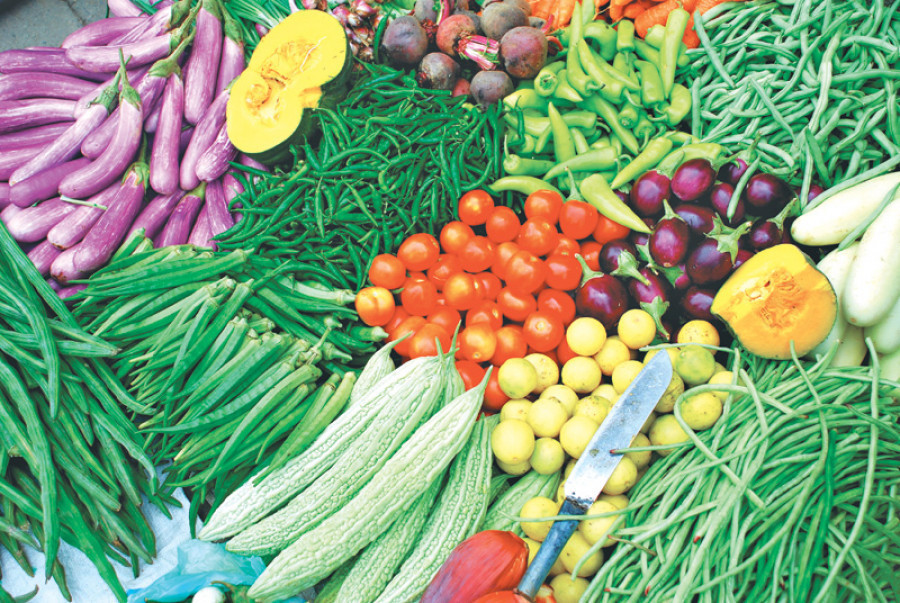Money
‘Organic’ province Karnali imports pesticide-laced vegetables
Various Indian vegetables are supplied in large quantities to Karnali without quarantine checks.
Krishna Prasad Gautam
Kamala Nepali of Barahatal rural municipality of Surkhet in western Nepal produces green leafy vegetables, cauliflower, cabbage, tomato and other organic vegetables.
Nepali, who owns seven ropani (0.36 hectares) of land, makes an annual income of Rs250,000 selling vegetables.
Most districts of the Karnali province produce organic vegetables since it was declared an organic province in February 2018.
But there is an irony.
Karnali province also imports pesticide-laden fruits and vegetables in huge quantities.
“As there is no pesticide testing lab in Karnali, consumers are compelled to consume poisonous vegetables in organic Karnali,” said Anil Budha, a local trader.
“If there were a pesticide testing lab, people in Karnali would get healthier vegetables to eat.”
Large quantities of Indian vegetables mainly potato, onion, chilli, carrot, bitter gourd, eggplant, and cauliflower are supplied to Karnali via Chitwan, Nepalgunj, Dang and Butwal without quarantine checks, Budha said.
The provincial government has been allocating a budget to establish a pesticide testing lab at Harray of Surkhet each year since 2019-20, but the money goes unspent every year.
Around Rs70 million of budget so far has gone unspent in different years. Failure to spend a budget within the designated fiscal year means the money goes back to state coffers and the intended beneficiary cannot reclaim it.
Karnali, a far-flung province, is abundant in onion, chilli, garlic and other vegetables imported from India due to its insufficient production to meet the demand.
The shortfall is not the only issue. Imported vegetables are cheaper even though most of them are flown in by paying hefty transport charges.
“The price of many vegetables imported from India is cheaper than the locally produced ones. So, consumers go for the cheaper options,” Nepali said.
For example, locally produced onions are priced over Rs100 a kg. But imported Indian onions are available at Rs80 a kg, said Nepali.
Kamala’s neighbor, Ambika Nepali, too produces vegetables in sufficient amounts. But she is also dependent on imported ones.
“Our village does not produce chilli. So, we are dependent on imports,” said Ambika.
Chilli is supplied from Rupaidiha, a small border town in Bahraich district in the Indian state of Uttar Pradesh, near the India-Nepal border across from Nepalgunj.
“Not only vegetables, but fruits like grapes, oranges, and pomegranates also come from India. Apples are imported from China,” said Bal Bahadur Shahi, another trader.
“Indian vegetables are supplied to Humla and Dolpa by air,” said Shahi.
Shahi said that vegetables produced in Karnali are seasonal.
“The local crops are too expensive compared to the imported ones,” he said.
The vegetables are flown into Humla and Dolpa from Nepalgunj and Surkhet by paying Rs125 per kilo as transport fare.
Anita Rokaya of Simkot, Humla, said local vegetable production meets the demand for two months. “In the remaining months, villagers have to rely on imports.”
According to her, the imported vegetables are normally priced at Rs300 per kg.
“Flights are irregular in Karnali due to weather factors. And if the flights are cancelled for a week, the region faces a scarcity of vegetables,” said Rokaya.
In an ambitious drive, after the formation of the provincial government, the first Cabinet meeting announced making Karnali an organic province in February 2018.
Two years later, at the second meeting of the Provincial Coordination Council in December 2019, Karnali adopted a resolution to make the region completely organic in two years.
To implement the resolution, a draft bill was prepared and approved by the first province assembly.
The idea behind the organic province initiative was to encourage agricultural practices and products free from chemicals, and, therefore, are healthy and environment friendly.
The initiative prohibits the use of chemically manufactured materials like synthetic pesticides, antibiotics and synthetic fertilizers.
“But in the lack of adequate preparation, staff, small budget, and no alternative to chemically manufactured materials, the campaign has made little headway,” said Bhim Prakash Sharma, minister for Land Management, Agriculture and Cooperatives of Karnali province.
According to Sharma, around Rs5 billion is being spent annually to make Karnali independent through production-oriented programmes.
“Our projects aim to make Karnali self-sufficient in food. It will take 4-5 years to see the results of the organic Karnali campaign,” Sharma said.
Insiders say there are several complaints over the misuse of agricultural subsidies as the support has not reached needy farmers and the subsidies have not improved their conditions. Most beneficiaries have been those who could exercise power or have connections with political leaders and bureaucrats.
Karnali imported agricultural products worth Rs710 million while it supplied crops worth Rs110 million to the market in the first six months of the current fiscal year that ended in mid-February, according to the Directorate of Agricultural Development in Karnali province.
Imports of cereals are also growing every passing year.
In the first six months of the current fiscal year, the province imported rice and lentils worth Rs1 billion from India.
According to the directorate, potato imports stood at Rs90.99 million in the review period.
“The import of potatoes shows our dependency is growing at an alarming level,” said Tilak Prasad Pandey, information officer at the directorate.
Agriculture production has been increasing annually in Karnali, but there is an imbalance in the production and supply due to the growing population.
“The shortfall is met by imports,” said Pandey.
Karnali imported fruits worth Rs350.58 million in the first six months of the current fiscal year ended in mid-January. “It, however, supplied fruits worth Rs90.74 million in the market in the review period,” Pandey said.
According to Pandey, Karnali imports 50 percent of its food grains, fruits and vegetables, while another 30 percent of food sourced from other provinces.
“That means, Karnali’s own production meets only 20 percent of its needs,” Pandey said.
According to the National Census-2021, Karnali province, which has a population of 1.68 million, faces a deficit of 25,000 tonnes of food items.
Karnali province has 299,339 hectares of farmland, but only 73 percent is being utilised. Less than a third of the farmlands have access to irrigation.
Keshav Sharma, an agriculture expert, said poor access to irrigation is one big reason behind the low output in the region despite its abundant land to feed its population.
Poor food production has forced many residents to seek opportunities in foreign lands, particularly in India. Out of the 10 districts of the province, Salyan, Rukum West and Surkhet are self-sufficient in food, whereas the remaining ones have to import.
According to reports, the historically low crop production and productivity in the province, and paucity of livelihoods may be a central driver of food insecurity in the area.
The mountain districts are areas with limited physical access, characterized by sparse road networks and long travel times to reach markets and essential services.
This results in higher food prices—cereal food prices were 45 percent higher in Karnali mountain districts than the national average.
The report shows that diversity of diet was also lower in Karnali mountain district households, with 24 percent of households having poor dietary diversity, against less than 13 percent of households in the rest of the province.
The households with lower dietary diversity consumed fewer nutrient-rich foods—including meat, fish, eggs, fruits and milk.
“Karnali can be self-reliant in food grains if its land is properly used,” Sharma said. “For this, it needs modern technology, human resources and a market. No one is bothered to address them all.”




 16.12°C Kathmandu
16.12°C Kathmandu













